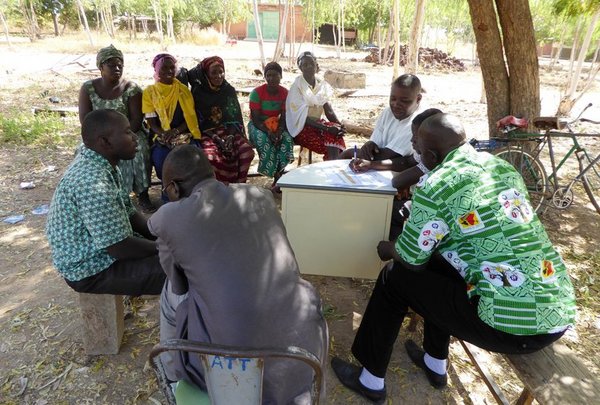- Share this article
- Subscribe to our newsletter
Small farmers build a strategy for their future
Clearly, farming and raising animals often cannot ensure families a decent and stable source of income. In Burkina Faso, small farmers, particularly women and youth, lack access to land, equipment and information. They do not have the right skills and the knowledge to adapt their production to new challenges such as climate change and urbanisation. Furthermore, they face considerable difficulties trying to get credit. In short, they are unable to benefit from the opportunities offered by local and international markets.
The Swiss Agency for Development and Cooperation Helvetas (SDC), together with SNV, a Dutch NGO, has started the first phase of PAPEA (Programme d’appui à la promotion de l’entrepreneuriat Agricole), a twelve-year programme that supports agricultural entrepreneurship. Financed by SDC, the scheme promotes the creation and strengthening of small businesses along the whole food value chain, from farm to fork, through the application of the Market System Development (MSD) approach.
Creating a functional environment
The central idea is that enterprises cannot thrive if they do not work within a well-functioning system. PAPEA promotes the creation of business clusters around promising produce. “Firms are used to competing to gain better market shares. We are fostering collaboration,” explains Bernard Conilh de Beyssac, Helvetas’ regional advisor on Sustainable and Inclusive Economy for West Africa. “With the help of PAPEA, enterprises operating in the same geographical area and value chain work together to assess common problems and find common solutions.” Instead of supporting single businesses in drafting their own plans, the project facilitates the launch of economic strategies at cluster levels.
The project works with local banks to help them shape and commercialise more inclusive financial products. And finally, it takes steps to establish consultation frameworks at a regional level, engaging local institutions to address transversal issues, such as natural resource management and/or regulations.
The first step is to get all the relevant players together to discuss constraints and opportunities. “Often, producers and buyers do not know and trust each other. Small farmers are used to producing what they always have, but they ignore market opportunities, or are not able to provide the quality requested by food processors and distributors,” says Conilh de Beyssac. “Buyers aren’t always fully aware of the challenges farmers face, and they both have difficulties in getting credit to expand their activities.”
Under PAPEA, these ‘business dialogues’ involve buyers and producers as well as service providers, vocational training centres and local authorities. PAPEA fosters the development of an economically sustainable system of services that support small agricultural business along promising value chains such as tomatoes, pork, chicken, strawberries, corn, millet and potatoes in four regions of Burkina Faso.
Concrete steps
The players within a market or a specific area discuss the main constraints in the system, for instance lack of access to improved seeds and adapted equipment, or difficulties in transport. Then, facilitated by the programme, they draft a collective strategy on boosting their activities, detailing how every player contributes.
“For example, if there is a potential to commercialise a new variety of tomato, PAPEA encourages buyers to talk directly with potential producers, and maybe negotiate a supply agreement that also includes the provision of improved seeds by the buyers to the farmers,” says Conilh de Beyssac.
The attention around the new tomato variety provides seed and fertiliser suppliers an incentive to increase their distribution network to new tomato-producing communities. Tomato producers also need technical advice on production and marketing. Local experts can see this as an opportunity to offer new advisory services. Also, training centres can enter with new courses to reinforce specific competences.
Thus, cluster strategies serve as a starting point to encourage local banks to create more suitable financial products tailored to the needs of small agricultural businesses.
PAPEA supports the adoption of agro-ecological and environmentally sustainable practices that not only increase the capacity to adapt to climate change, but also offer new business opportunities.
The programme is targeting 6,000 agriculture enterprises with the aim to improve the lives of 24,000 people. Of these, 60 per cent are under the age of 35 years and 50 per cent are women.
(Helvetas/wi)
More information on Helvetas’ engagement in Burkina Faso:
https://www.helvetas.org/en/switzerland/what-we-do/where-we-work/partner-countries/burkina-faso





Add a comment
Be the First to Comment